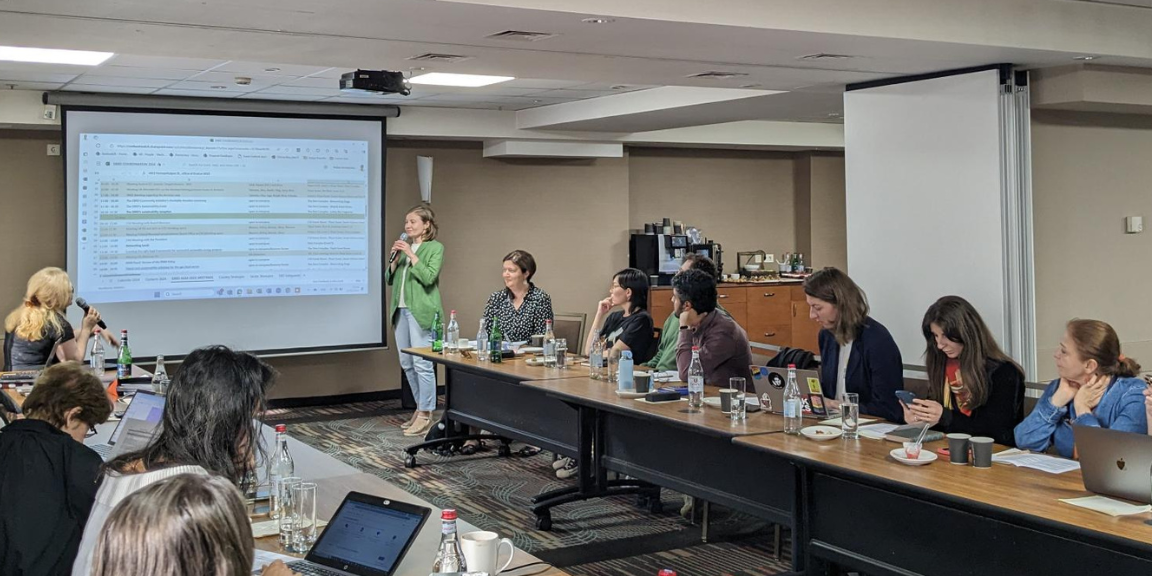Civil society urges the EBRD to adopt responsible policies and reaffirm its commitment to promoting democracy
As the European Bank for Reconstruction and Development (EBRD) gathers for its 33rd Annual Meeting in Yerevan (1), civil society organisations have united to challenge the EBRD’s flawed policies. They highlight numerous cases where EBRD investments have had negative impacts on communities and the environment (2). CEE Bankwatch Network, a leading organisation in this effort, is also calling on the EBRD to take decisive action against the increasing repression of civil society in the countries where it operates.
14 May 2024

With the recent adoption of the ‘foreign representatives’ law in Kyrgyzstan and a similar ‘foreign influence’ bill set to be passed by the Georgian parliament, civic space continues to shrink in countries within the EBRD region. In this context, the need for enhanced human rights safeguards and a clear reaffirmation of the EBRD’s commitment to promoting multiparty democracy is more urgent than ever (3).
Mark Martin, executive director of CEE Bankwatch Network, says: ‘International financial institutions must not turn a blind eye to the growing threats to civil society in Georgia and other countries in the region. If the situation in Georgia continues to escalate, we expect the EBRD, together with other international financial institutions such as the Asian Development Bank and the World Bank Group, to step up the pressure and halt funding to the government or entities linked to the ruling Georgian Dream party.’
As it revises its good governance policies this year, the EBRD has a golden opportunity to improve its human rights due diligence. Despite heavily increasing investments in green projects in recent years, the EBRD still lacks an effective system for safeguarding human rights, as highlighted in a joint statement on the EBRD’s draft safeguards signed by 60 civil society organisations.
Nina Lesikhina, policy officer at CEE Bankwatch Network, says: ‘The EBRD’s efforts to engage with communities as part of its due diligence remains weak. At its Annual Meeting in Yerevan, the EBRD is once again seeking civil society’s views on its investments. But this practice should be routinely implemented at the project level as well. Communities should always have an opportunity to discuss project risks and impacts directly with the Bank. Their involvement helps to inform investment decisions and prevent harm during project implementation. But for this to happen, the EBRD needs to improve transparency and implement effective anti-retaliation measures to protect those who speak out.’
The EBRD is also currently reviewing its Agricultural Sector Strategy, an opportunity to learn from past mistakes and promote decentralised, fair and environmentally friendly agricultural production. This is particularly important for Ukraine as it rebuilds its economy.
Anna Danyliak, national coordinator for Ukraine at Ecoaction and CEE Bankwatch Network, says: ‘While EBRD investments have helped increase agricultural production in its countries of operation, there’s still an urgent need to address regional and global challenges. In Ukraine, significant EBRD investments in the agribusiness sector have contributed to the rise of large-scale agriculture companies that now monopolise the market. However, these massive investment projects haven’t been subject to proper baseline assessments or environmental impact monitoring, with some approved before they were even disclosed. If the EBRD is truly committed to developing sustainable agri-food systems, this approach must be abandoned for good.’
Finally, Bankwatch urges the EBRD to address a range of issues with its new Sustainable Infrastructure Strategy, which guides its investments in solid waste, urban transport and highway infrastructure. To avoid harm, delays, as well as legal and financial risks, important decisions on the siting of facilities, the routing of transport corridors, and the assessment and management of potential risks and impacts on nature, cultural heritage, communities and livelihoods must be made transparently and in consultation with affected communities and stakeholders.
Fidanka Bacheva-McGrath, Cities for People strategic area leader at CEE Bankwatch Network, says: ‘Sustainable infrastructure investments aimed at decarbonising cities and transport systems can only succeed if they ensure public participation, inclusion and accessibility, especially for vulnerable groups. All too often we see green projects facing problems during implementation or failing to achieve their transformative objectives. Despite the considerable challenges involved, there’s still huge potential for climate investments in the water, solid waste and transport sectors as long as the EBRD changes its approach to transparency, governance and affordability for the better.’
For more information, please contact:
Michaela Kožmínová, Communications Officer at CEE Bankwatch Network | michaela.kozminova@bankwatch.org
Notes for editors:
(1) All Bankwatch materials for the EBRD Annual Meeting are available here: https://bankwatch.org/ebrd-annual-meeting-2024
(2) The EBRD’s failure to protect human rights has been put into sharp focus on the Amulsar gold mine project in Armenia, the Indorama Agro cotton project in Uzbekistan, the Corridor Vc motorway project in Bosnia and Herzegovina, and many other projects that Bankwatch and its partners have been monitoring in recent years.
(3) See the statement by Bankwatch’s Executive Director on the shrinking civic space for civil society in Georgia, Kyrgyzstan and other EBRD’s countries of operation: https://bankwatch.org/blog/statement-by-bankwatch-s-executive-director-on-the-shrinking-space-for-civil-society-in-georgia-kyrgyzstan-and-other-ebrd-s-countries-of-operation
Never miss an update
We expose the risks of international public finance and bring critical updates from the ground – straight to your inbox.
Institution: EBRD
Theme: EBRD Annual Meeting
Location: Armenia
Project: Indorama agro
Tags: EBRD | Green cities | agriculture | human rights
